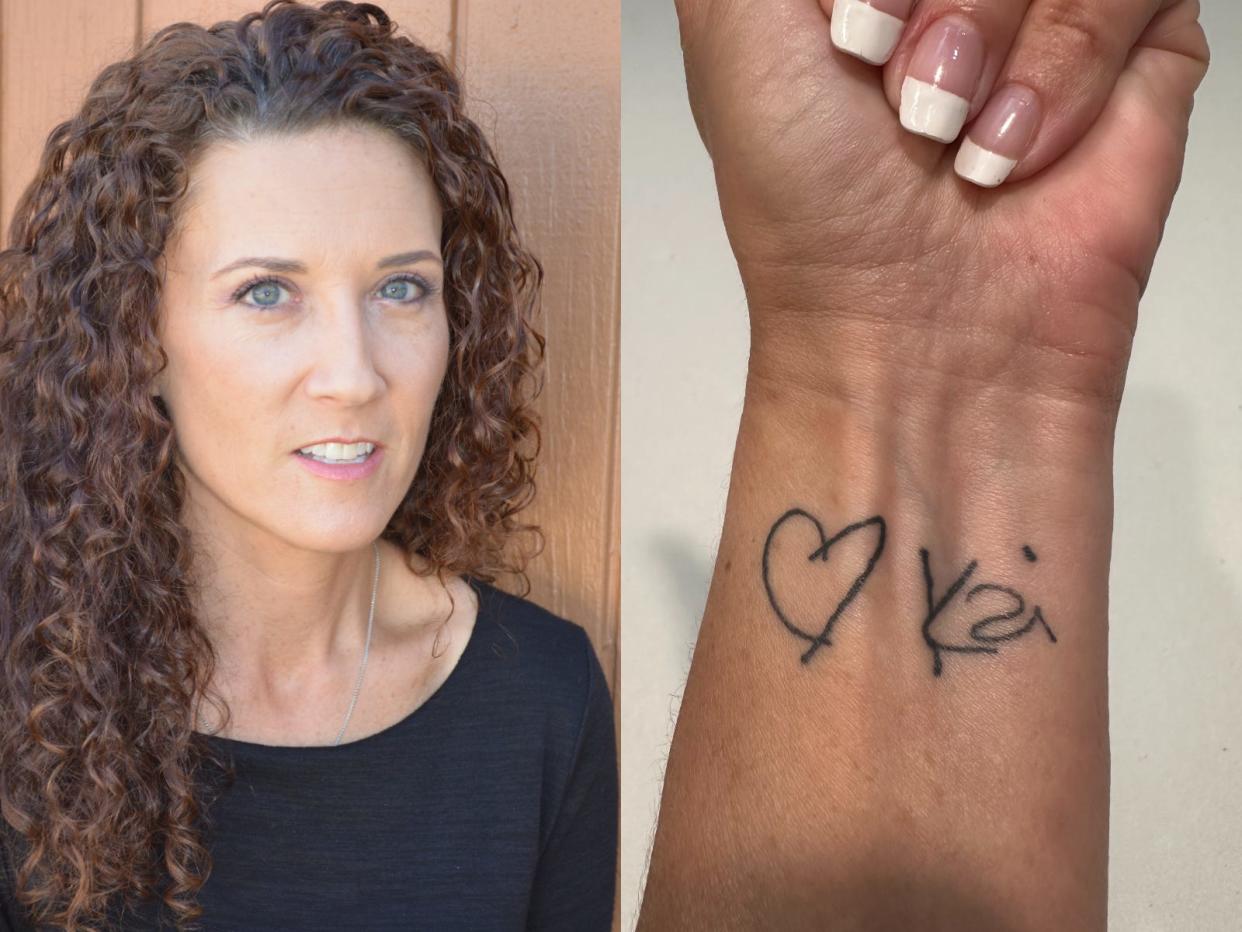I despised and mocked people with tattoos my whole life. But then my husband died, and I decided to get one in my 50s.

I spent my whole life thinking tattoos were gross.
Then my husband died, and I understood why someone would want to permanently mark their bodies.
When I was in my mid-50s, I got my first tattoo as a memorial for my husband.
"Can you replicate this exactly?" I asked the tattoo artist. "If it can't be drawn like this, there's no point."
Justin, the tattoo artist, went to work with a Sharpie and then peeled the transfer paper from inside my left wrist.
"Go check it out in the mirror," he said. "This is the only part that isn't permanent. Be certain you like it."
I studied my reflection and told Justin it was perfect. I couldn't help but laugh at what I was about to do. There I was, a 50-something-year-old getting her first tattoo after years of criticizing people who got inked.
I always thought tattoos were gross
I grew up in middle-class Midwestern suburbia. When I was young, tattoos were just not a thing. I thought people with tattoos were druggies, dropouts, or criminals.
The first tattoo I saw on someone my age was at a party during my senior year of high school. A crowd of people gathered around this girl, screaming, "Show us! Show us!" Looking at the nickel-sized Egyptian eye on her shoulder blade, all I could think was: Ew, gross. Of course, the girl had just gotten out of rehab, so I smugly said to myself, "Makes sense."
Over the years, even as tattoos became more and more mainstream, I was always grossed out when I saw one. It's hard to admit this, but I looked down on tattooed people — no matter who they were.
For more than five decades, I wore my unmarked skin as a point of pride — proof of my holier-than-thou-ness.
I also couldn't imagine myself getting inked. I was a middle-aged cis female with a master's degree and a professional job. Why in the world would I want a tattoo? Tattoos were ugly, stupid, expensive, and permanent.
But then, my beloved husband died
From the moment he and I locked eyes for the first time across the room of a grad-school welcome party, we were inseparable. They say that when a couple gets married, the two become one. For us and our relationship, this felt almost literally true.
In our 25 years of marriage, we spent less than a couple of weeks apart. During an eight-hour workday, dozens of "I miss you" texts and phone calls went back and forth between us. We left love notes on Post-its hidden in wallets and briefcases. We went everywhere together, did everything together, and chose each other's company and physical presence even when there was no conversation. All we wanted, all we needed, was each other.
As it happens for so many, the surprise cancer diagnosis came too late to save his life. Even still, his death was so fast — just five months — that I had no opportunity to process or prepare for it. I had spent the entirety of my adult life with this man by my side, and our life together was ripped apart.
Nothing about life without him made sense
Except for our children and my closest friends, people tiptoed around the subject with me, afraid to bring up his death, hardly daring to even say his name.
The silence was — and is — so hard to take. I also felt unseen now that I had become a widow. When a person loses an arm or a leg, that physical loss is impossible to miss. I felt like my soul had been ripped out of me, but I had no conspicuous wound to show for it — something to state at a glance: I am no longer whole. Look at what I've lost.
I didn't want a physical wound to gain sympathy from others, but to be true to myself and my new reality as the surviving half. That's when I realized a tattoo is a scar. The wound — and its permanence — is freely chosen.
Suddenly, I understood why people chose to get tattoos. I wanted to tell every tattooed person, "I get you. I see you. I am sorry and ashamed."
Getting a tattoo seemed the perfect solution
I decided it was time for my first tattoo, but I couldn't figure out what to get inked on my skin. I wracked my brain, brainstorming and rejecting myriad possibilities. When the idea finally dawned on me one late-summer morning, I was stunned I hadn't figured it out before.
The signature he used on more than a quarter century of love notes to me and the small heart with two separate strokes — it would all make the perfect tattoo.
I now see my ink all day long. It's a memorial and tribute to my husband, who was and is forever a part of me — not just figuratively speaking. It's a permanent love note.
"I love you too," I tell it.
Read the original article on Insider


